February 2023 eNews | Insulin $35 Cap, New SGLT-2i, Scholarships & Sale
Happy February
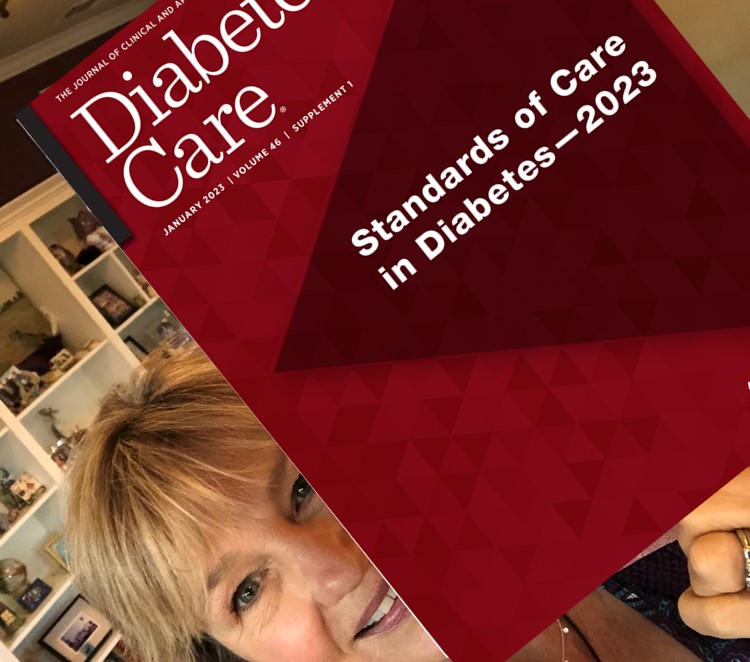
February is the month we celebrate love.
In my opinion, love is at the center of providing diabetes care and education. We open our hearts as we carefully listen to people share their stories about living with diabetes. We celebrate successes and grieve losses alongside the individuals we serve every day. We speak our hearts when we advocate for evidence-based care that enhances well-being and improves outcomes.
In celebration of the compassionate contributions of diabetes care and education specialists, we are excited to announce our “Spreading the Love” Sale during the week of Valentine’s Day.
This month, we are delighted to share our updated Diabetes Education Services logos, celebrating 25 years of growth, connection, and inspiration. Keep your eyes open for website and online communications that include our freshened-up logo coupled with a 25.
For this month’s newsletter, we highlight the new Medicare $35 Insulin cap, discuss how treatments to delay type 1 diabetes might lead to childhood screening, announce a new SGLT-2i and of course test your knowledge with our Question and Rationale of the Week.
Lastly, we are offering two “Making a Difference” Scholarships, which provide a pair of deserving recipients with free registration for our Virtual DiabetesEd Training Course in late April.
It has been a complete joy to serve our community and provide meaningful courses, newsletters, blogs, cheat sheets, and content that makes a real difference in people’s lives since 1998. Who knows what we will come up with in the next 25 years?
With gratitude for our amazing community,
Coach Beverly and Bryanna
Featured Articles
- Insulin Cap of $35 for Medicare
- New “Savvy” SGLT-2i approved.
- Type 1 Diabetes Delay
- Making a Difference Scholarship for Virtual Conference
- Question of the Week
- Rationale of the Week
Upcoming Webinars
- ADA Standards Update – Feb 2nd at 11:30am PST
- Level 3 Boot Camp Series
- Upcoming Events – See complete calendar listing
- Virtual DiabetesEd Training Conference – April 26th
- BC-ADM Prep Webinar- Feb 20th
Want to learn more about Diabetes Care?
Virtual DiabetesEd Training Conference | Earn 30+ CEs
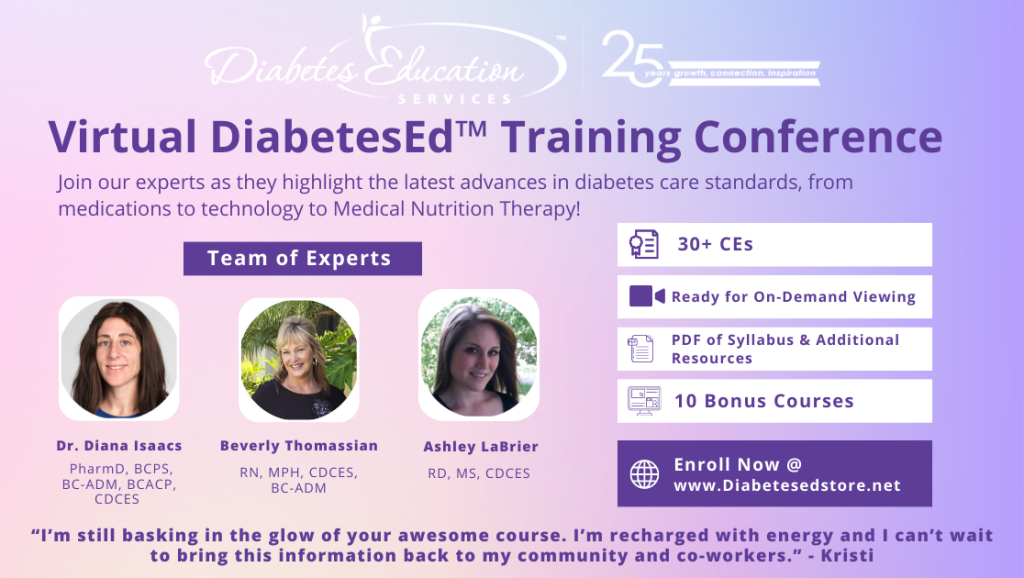
Whether you are new to diabetes or a seasoned expert, you’ll benefit from this virtual conference with the latest research plus critical content that you can immediately apply to your clinical practice.
If you are seeking a state-of-the-art review of current diabetes care, this course is for you. Our team has been fine-tuning this course for over fifteen years, and we know what you need. This program can also be a great addition to your CDCES or BC-ADM exam study plan.
Group discounts are available!*
Download Course Flyer | Download Schedule
All hours earned count toward your CDCES Accreditation Information
Sign up for Diabetes Blog Bytes – we post one daily Blog Byte from Monday to Friday. And of course, Tuesday is our Question of the Week. It’s Informative and FREE! Sign up below!
The use of DES products does not guarantee the successful passage of the CDCES exam. CBDCE does not endorse any preparatory or review materials for the CDCES exam, except for those published by CBDCE.
Question of the Week | Safe for Surgery?

PZ is having elective surgery in the morning. Diabetes medications include 20 units glargine (Semglee) at hs, metformin BID and empagliflozin (Jardiance).
According to 2023 ADA Standards, what are the best actions for a safe surgery?
- Give 15 units hs glargine, hold am oral meds, keep intraoperative glucose between 100-180.
- Give 10 units hs glargine and am metformin, hold empagliflozin and use sliding scale as needed.
- Give 20 units glargine, hold oral meds, get A1C less than 7% within 3 months before surgery.
- Hold all oral meds for 3 days, given 50% of basal insulin and maintain glucose 80-140 intraoperatively.
Click Here to Test your Knowledge
Want to learn more about this question? Enroll in our
Level 2 | ADA Standards of Care CE Course | 2.0 CEs
2023 Update is Recorded & Ready to Watch!

This course, updated annually, is an essential review for anyone in the field of diabetes. Join Coach Beverly as she summarizes the 2023 updates to the American Diabetes Association’s Standards of Medical Care in Diabetes and provides critical teaching points and content for healthcare professionals involved in diabetes care and education.
Objectives:
- List significant changes and updates to the 2023 ADA Standards of Medical Care.
- State 3 updates on new blood pressure and lipid goals.
- Identify 5 key elements of the position statement.
- Discuss how to apply the Standards in the clinical setting and in preparation for exam success.
Intended Audience: This course is a knowledge-based activity designed for individuals or groups of diabetes professionals, including RNs, RDs, Pharmacists, Nurse Practitioners, Clinical Nurse Specialists, Physician Assistants, and other health care providers interested in staying up to date on current practices of care for people with prediabetes, diabetes, and other related conditions.
Don’t worry if you can’t make it live. Your registration guarantees access to the recorded version in the Online University.
All hours earned count toward your CDCES Accreditation Information
Preparing for Diabetes Certification Exam? Enroll in our Level 3 – Boot Camp 2023 Updates
Level 3 | DiabetesEd Specialist Boot Camp | 12+ CEs

Can’t join all the sessions live? No problem. Your registration guarantees you access to the recorded lectures for a full year.
This bundle is specifically designed for healthcare professionals who are studying for the Board Certified in Advanced Diabetes Management (BC-ADM) or the Certified Diabetes Care and Education Specialist (CDCES) certification exam.
Intended Audience: This library of critical information is designed for individuals or groups of diabetes specialists, including RNs, RDs, Pharmacists, Nurse Practitioners, Clinical Nurse Specialists, Physician Assistants, and other health care providers interested in staying up to date on current practices of care for people with diabetes and preparing for the BC-ADM or the CDCES certification Exam.
2023 Webinar Updates
- Recorded & Ready to Watch – Class 1 – Diabetes – Not Just Hyperglycemia 1.75 CEs
- February 9, 2023 – Class 2 – Standards of Care & Cardiovascular Goals 1.8 CEs
- February 14, 2023 – Class 3 – Meds for Type 2 – What you need to know 1.5
- February 16, 2023 – Class 4 – Insulin Therapy – From Basal/Bolus to Pattern Management 1.5 CEs
- February 21, 2023 – Class 5 – Insulin Intensive – Monitoring, Sick Days, Lower
- February 23, 2023 – Class 6 – Exercise and Medical Nutrition Therapy 1.5 CEs
- February 28, 2023 – Class 7 – Screening, Prevention, and Treatment of Microvascular Complications
- March 2, 2023 – Class 8 – Coping and Behavior Change 1.5 CEs
- March 9, 2023 – Class 9 – Test-Taking Coach Session (48 Questions) No CE
All hours earned count toward your CDCES Accreditation Information
Sign up for Diabetes Blog Bytes – we post one daily Blog Byte from Monday to Friday. And of course, Tuesday is our Question of the Week. It’s Informative and FREE! Sign up below!
The use of DES products does not guarantee the successful passage of the CDCES exam. CBDCE does not endorse any preparatory or review materials for the CDCES exam, except for those published by CBDCE.
You’re invited – Prep for CDCES Exam FREE Webinar | Tues., January 31st
Rationale of the Week | What is the Right LDL Target for RZ?

For last week’s practice question, we quizzed participants on what is the right LDL target. 37% of respondents chose the best answer. We want to clarify and share this important information, so you can pass it on to people living with diabetes and your colleagues, plus prepare for exam success!
Before we start though, if you don’t want any spoilers and haven’t tried the question yet, you can answer it below: Answer Question
Question:
RZ is 47 years old with type 2 diabetes and hypertension with a UACR of 199 mg/g. RZ takes metformin 1000 mg BID, plus lisinopril 20mg daily. RZ most recent LDL Cholesterol was 130 mg/dL. The provider writes an order for DASH meal planning education and initiation of atorvastatin 40mg.
Based on the most recent ADA Standards, what is the LDL Cholesterol target for RZ?
Answer Choices:
- LDL less than 100 mg/dL.
- Lower LDL by 30%.
- LDL target of 65 mg/dL or less.
- Determine LDL target based on ASCVD calculations.
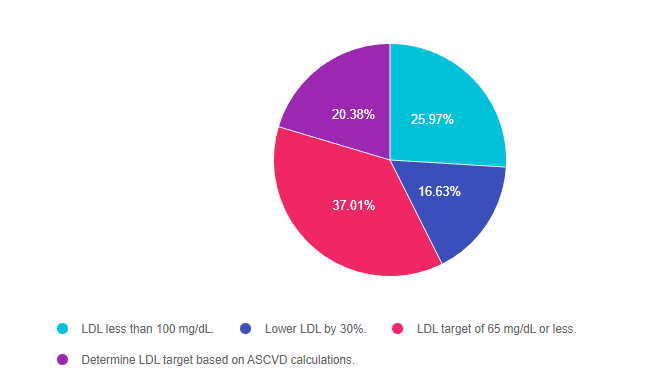
Getting to the Best Answer
Answer 1 is incorrect. 25.97% chose this answer, “LDL less than 100 mg/dL.” This is a juicy answer since it is the OLD LDL goal from several years ago. But the new 2023 lipid guidelines have even more intense goals for high-risk individuals. Since RZ has diabetes, hypertension, and albuminuria (UACR >30mg/g), they have an elevated risk of ASCVD. Given their risk status, the 2023 guidelines recommend reducing LDL by at least 50% of baseline and target LDL cholesterol to less than 70 mg/dL (see slide below).
Answer 2 is incorrect. 16.63% of you chose this answer, “Lower LDL by 30%.” Another juicy answer. Given RZ’s risk status, the 2023 guidelines recommend reducing LDL by at least 50% of baseline and target LDL cholesterol to less than 70 mg/dL. (see slide below).
Answer 3 is correct. 37.01% of respondents chose this answer, “LDL target of 65 mg/dL or less.” GREAT JOB! Since RZ has diabetes, hypertension, and albuminuria (UACR >30mg/g), they have an elevated risk of ASCVD. Given their risk status, the 2023 guidelines recommend reducing LDL by at least 50% of baseline and target LDL cholesterol to less than 70 mg/dL. Since RZ’s current LDL is 130, the goal is to reduce the LDL by at least 50% (LDL of 65mg/dL) AND less than 70 mg/dL by using a high-intensity statin and lifestyle therapy, (see slide below).
Finally, Answer 4 is incorrect. 20.38% chose this answer, “Determine LDL target based on ASCVD calculations.” Although this information would be helpful, it wouldn’t change the lipid goals. Given their risk status, the 2023 guidelines recommend reducing LDL by at least 50% of baseline and target LDL cholesterol to less than 70 mg/dL, (see slide below).
Thank you so much for reading this “Rationale of the Week”.
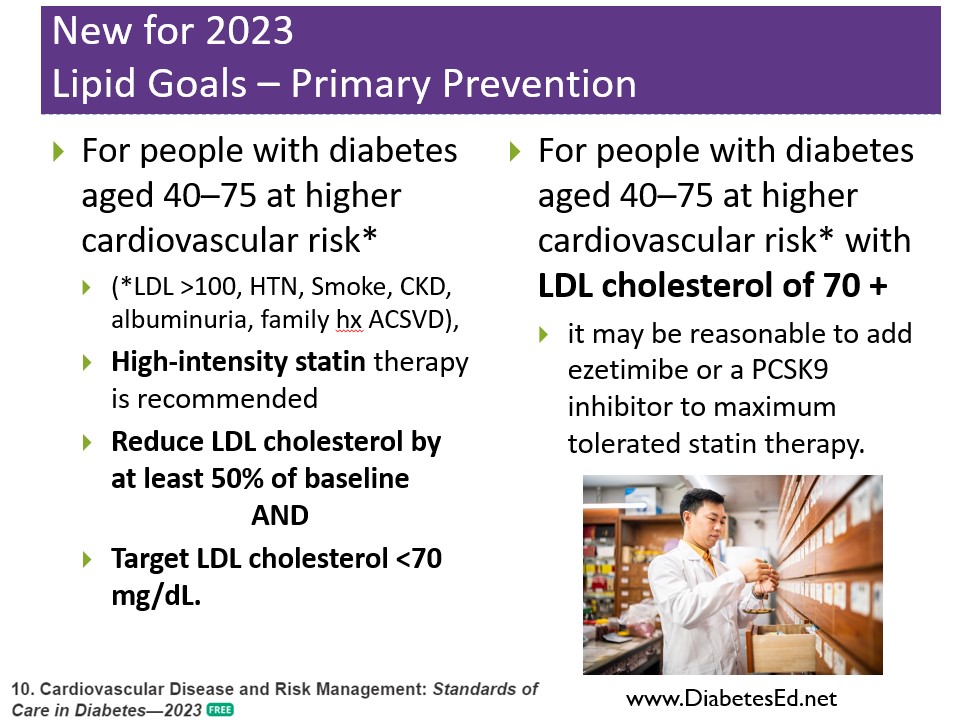
We also invite you to join our Online Courses for more information (see info below)
Hope you can join our ADA Standards of Care Webinar Update in February and our other Level 2 Courses.
Want to learn more about this question? Join us for our
Level 2 | ADA Standards of Care CE Course | 2.0 CEs
Updates air live between Feb. 2, 2023, at 11:30 am PST

This course, updated annually, is an essential review for anyone in the field of diabetes. Join Coach Beverly as she summarizes the 2023 updates to the American Diabetes Association’s Standards of Medical Care in Diabetes and provides critical teaching points and content for healthcare professionals involved in diabetes care and education.
Objectives:
- List significant changes and updates to the 2023 ADA Standards of Medical Care.
- State 3 updates on new blood pressure and lipid goals.
- Identify 5 key elements of the position statement.
- Discuss how to apply the Standards in the clinical setting and in preparation for exam success.
Intended Audience: This course is a knowledge-based activity designed for individuals or groups of diabetes professionals, including RNs, RDs, Pharmacists, Nurse Practitioners, Clinical Nurse Specialists, Physician Assistants, and other health care providers interested in staying up to date on current practices of care for people with prediabetes, diabetes and other related conditions.
Don’t worry if you can’t make it live. Your registration guarantees access to the recorded version in the Online University.
All hours earned count toward your CDCES Accreditation Information
Preparing for Diabetes Certification Exam? Enroll in our Level 3 – Boot Camp 2023 Updates
Level 3 | DiabetesEd Specialist Boot Camp | 12+ CEs

Can’t join all the sessions live? No problem. Your registration guarantees you access to the recorded lectures for a full year.
This bundle is specifically designed for healthcare professionals who are studying for the Board Certified in Advanced Diabetes Management (BC-ADM) or the Certified Diabetes Care and Education Specialist (CDCES) certification exam.
Intended Audience: This library of critical information is designed for individuals or groups of diabetes specialists, including RNs, RDs, Pharmacists, Nurse Practitioners, Clinical Nurse Specialists, Physician Assistants, and other health care providers interested in staying up to date on current practices of care for people with diabetes and preparing for the BC-ADM or the CDCES certification Exam.
2023 Webinar Updates
- February 7, 2023 – Class 1 – Diabetes – Not Just Hyperglycemia 1.75 CEs
- February 9, 2023 – Class 2 – Standards of Care & Cardiovascular Goals 1.8 CEs
- February 14, 2023 – Class 3 – Meds for Type 2 – What you need to know 1.5
- February 16, 2023 – Class 4 – Insulin Therapy – From Basal/Bolus to Pattern Management 1.5 CEs
- February 21, 2023 – Class 5 – Insulin Intensive – Monitoring, Sick Days, Lower
- February 23, 2023 – Class 6 – Exercise and Medical Nutrition Therapy 1.5 CEs
- February 28, 2023 – Class 7 – Screening, Prevention, and Treatment of Microvascular Complications
- March 2, 2023 – Class 8 – Coping and Behavior Change 1.5 CEs
- March 9, 2023 – Class 9 – Test-Taking Coach Session (48 Questions) No CE
All hours earned count toward your CDCES Accreditation Information
Sign up for Diabetes Blog Bytes – we post one daily Blog Byte from Monday to Friday. And of course, Tuesday is our Question of the Week. It’s Informative and FREE! Sign up below!
The use of DES products does not guarantee the successful passage of the CDCES exam. CBDCE does not endorse any preparatory or review materials for the CDCES exam, except for those published by CBDCE.
Question of the Week | Diabetes and NASH, what is the link?

The provider referred RT, a 72-year-old with type 2 diabetes and non-alcoholic fatty steatohepatitis (NASH), for an appointment with the diabetes care and education specialist. RT is frightened because their brother died of liver cancer.
Which of the following is the most accurate statement regarding NASH and diabetes?
- NASH is when intrahepatic fat is equal to or greater than 5% of liver weight.
- About 30% of people with diabetes and extra weight also have NASH.
- There are standardized medication algorithms to guide the treatment of NASH.
- Risk of NASH is greater in people who consume excess alcohol and processed foods.
Click Here to Test your Knowledge
Want to learn more about this question? Join us for our
Level 2 | ADA Standards of Care CE Course | 2.0 CEs
Updates air live between Feb. 2, 2023, at 11:30 am PST

This course, updated annually, is an essential review for anyone in the field of diabetes. Join Coach Beverly as she summarizes the 2023 updates to the American Diabetes Association’s Standards of Medical Care in Diabetes and provides critical teaching points and content for healthcare professionals involved in diabetes care and education.
Objectives:
- List significant changes and updates to the 2023 ADA Standards of Medical Care.
- State 3 updates on new blood pressure and lipid goals.
- Identify 5 key elements of the position statement.
- Discuss how to apply the Standards in the clinical setting and in preparation for exam success.
Intended Audience: This course is a knowledge-based activity designed for individuals or groups of diabetes professionals, including RNs, RDs, Pharmacists, Nurse Practitioners, Clinical Nurse Specialists, Physician Assistants, and other health care providers interested in staying up to date on current practices of care for people with prediabetes, diabetes, and other related conditions.
Don’t worry if you can’t make it live. Your registration guarantees access to the recorded version in the Online University.
All hours earned count toward your CDCES Accreditation Information
Preparing for Diabetes Certification Exam? Enroll in our Level 3 – Boot Camp 2023 Updates
Level 3 | DiabetesEd Specialist Boot Camp | 12+ CEs

Can’t join all the sessions live? No problem. Your registration guarantees you access to the recorded lectures for a full year.
This bundle is specifically designed for healthcare professionals who are studying for the Board Certified in Advanced Diabetes Management (BC-ADM) or the Certified Diabetes Care and Education Specialist (CDCES) certification exam.
Intended Audience: This library of critical information is designed for individuals or groups of diabetes specialists, including RNs, RDs, Pharmacists, Nurse Practitioners, Clinical Nurse Specialists, Physician Assistants, and other health care providers interested in staying up to date on current practices of care for people with diabetes and preparing for the BC-ADM or the CDCES certification Exam.
2023 Webinar Updates
- February 7, 2023 – Class 1 – Diabetes – Not Just Hyperglycemia 1.75 CEs
- February 9, 2023 – Class 2 – Standards of Care & Cardiovascular Goals 1.8 CEs
- February 14, 2023 – Class 3 – Meds for Type 2 – What you need to know 1.5
- February 16, 2023 – Class 4 – Insulin Therapy – From Basal/Bolus to Pattern Management 1.5 CEs
- February 21, 2023 – Class 5 – Insulin Intensive – Monitoring, Sick Days, Lower
- February 23, 2023 – Class 6 – Exercise and Medical Nutrition Therapy 1.5 CEs
- February 28, 2023 – Class 7 – Screening, Prevention, and Treatment of Microvascular Complications
- March 2, 2023 – Class 8 – Coping and Behavior Change 1.5 CEs
- March 9, 2023 – Class 9 – Test-Taking Coach Session (48 Questions) No CE
All hours earned count toward your CDCES Accreditation Information
Sign up for Diabetes Blog Bytes – we post one daily Blog Byte from Monday to Friday. And of course, Tuesday is our Question of the Week. It’s Informative and FREE! Sign up below!
The use of DES products does not guarantee the successful passage of the CDCES exam. CBDCE does not endorse any preparatory or review materials for the CDCES exam, except for those published by CBDCE.
Rationale of the Week | Why is post-exercise glucose spiking?

For last week’s practice question, we quizzed participants on why glucose is spiking after exercise. 80% of respondents chose the best answer. We want to clarify and share this important information, so you can pass it on to people living with diabetes and your colleagues, plus prepare for exam success!
Before we start though, if you don’t want any spoilers and haven’t tried the question yet, you can answer it below: Answer Question
Question:
JR is 42 years old with type 2 diabetes and has worked up to brisk walking for 30 minutes on most days. JR has an A1C of 6.7% and takes an SGLT-2, metformin, and lovastatin along with trying to eat healthfully. JR decided to check blood sugars an hour after exercise and was surprised to see post-exercise blood glucose in the 180’s on two different days. JR asks you why their blood glucose actually rises after exercise.
What is the diabetes specialist’s best response?
Answer Choices:
- This is most likely due to a low blood sugar from your medications followed by rebound hyperglycemia.
- Blood sugars normally drop after exercise. When is the last time you performed quality control on your meter?
- I understand what you are saying. It sounds like this blood sugar elevation is causing you some anxiety.
- Exercising causes the release of hormones that can temporarily cause your blood sugar to rise.
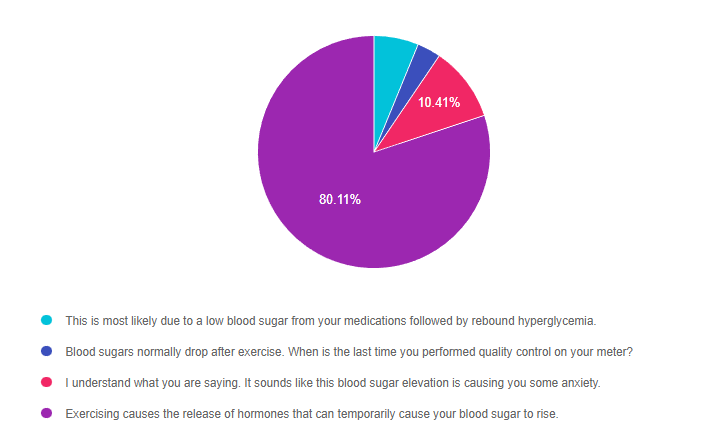
Getting to the Best Answer
Answer 1 is incorrect. 6.19% chose this answer, “This is most likely due to a low blood sugar from your medications followed by rebound hyperglycemia.” This answer is tempting, but not accurate. Since JR’s only diabetes medication include metformin and a SGLT-2 inhibitor, they are not at risk for low blood sugar. Low blood sugar is only associated with sulfonylureas, meglitinides and insulin therapy.
Answer 2 is incorrect. 3.29% of you chose this answer, “Blood sugars normally drop after exercise. When is the last time you performed quality control on your meter?” In this situation, exercise can decrease hours after exercise, but usually increases immediately after exercise. Which means, JR doesn’t need to perform quality control on their glucose meter, since it is accurately reflecting blood sugar trends.
Answer 3 is incorrect. 10.41% of respondents chose this answer, “I understand what you are saying. It sounds like this blood sugar elevation is causing you some anxiety.” Although, this is a very compassionate response, it does not answer the question JR is asking, “why does my blood sugar go up after exercise?” For this reason, it is tempting, but not the best answer.
Finally, Answer 4 is correct. 80.11% chose this answer, “Exercising causes the release of hormones that can temporarily cause your blood sugar to rise.” YES, most of you chose the best answer. With exercise, counterregulatory or stress hormones are activated, which increases insulin resistance and causes blood glucose levels to temporarily rise to feed hungry muscles. This glucose rise is an expected temporary response and with time, blood sugars get back to baseline. GREAT JOB.
Thank you so much for reading this “Rationale of the Week”.
We also invite you to join our Online Courses for more information (see info below)
Hope you can join our ADA Standards of Care Webinar Update in February.
Want to learn more about this question? Enroll in our upcoming
Level 1 | Diabetes Fundamentals 2023 Updates | 9+ CEs

This bundle is specifically designed for healthcare professionals who want to learn more about diabetes fundamentals for their clinical practice or for those who are studying for the Certified Diabetes Care and Education Specialist (CDCES) exam.
Intended Audience: This library of critical information is designed for individuals or groups of diabetes specialists, including RNs, RDs, Pharmacists, Nurse Practitioners, Clinical Nurse Specialists, Physician Assistants, and other health care providers interested in staying up to date on current practices of care for people with diabetes and preparing for the CDCES Certification Exam.
2023 Webinar Updates
- Recorded & Ready to watch on-demand – Class 1 – Getting to the Nitty Gritty 1.5 CEs
- Recorded & Ready to watch on-demand – Class 2 – Nutrition and Exercise 1.5 CEs
- Recorded & Ready to watch on-demand – Class 3 – Meds Overview for Type 2 – 1.5 CEs
- January 19, 2023 – Class 4 – Insulin Therapy & Pattern Management 1.5 CEs
- January 24, 2023 – Class 5 – Goals of Care – 1.5 CEs
- January 26, 2023 – Class 6 – Hypoglycemia, Sick Days, Monitoring, Foot Care 1.5 CEs
All hours earned count toward your CDCES Accreditation Information

Want an overview of the new 2023 ADA Standards of Care in Diabetes?
Join us live on February 2, 2023, at 11:30 am PST for our
Level 2 | ADA Standards of Care 2023 Update | 2.0 CEs
This course, updated annually, is an essential review for anyone in the field of diabetes. Join Coach Beverly as she summarizes the 2023 updates to the American Diabetes Association’s Standards of Medical Care in Diabetes and provides critical teaching points and content for healthcare professionals involved in diabetes care and education.
All hours earned count toward your CDCES Accreditation Information
Sign up for Diabetes Blog Bytes – we post one daily Blog Byte from Monday to Friday. And of course, Tuesday is our Question of the Week. It’s Informative and FREE! Sign up below!
The use of DES products does not guarantee the successful passage of the CDCES exam. CBDCE does not endorse any preparatory or review materials for the CDCES exam, except for those published by CBDCE.
Why adding GLP-1 RA or GIP/GLP-1 RA before Basal Insulin is Recommended
In the past, if a person with type 2 diabetes can’t get blood glucose to target on oral meds, the next action would be to add basal insulin. However, the latest guidelines, found in the ADA 2023 Standard 9, encourages providers to consider adding a GLP-1 RA or GIP/GLP-1 RA before writing that prescription for basal insulin.
Diabetes pharmacologic management has dramatically changed over the past few years with the addition of Incretin Mimetics (GLP-1 RA and GIP/GLP-1 RAs) and SGLT2i’s to the medication landscape. The pathways and algorithms have been adjusted to incorporate these newer medication options, which significantly lower glucose without the risk of low blood sugar or weight gain like insulin or sulfonylureas.
GLP-1 RA or GIP/GLP-1 RA versus Insulin Therapy
The truth is, insulin will always lower blood glucose levels, but users may experience the side effects of hypoglycemia and unwanted weight gain. However, for some people, adding insulin is still the next best step. According to the ADA Standard 9, “health care professionals should consider insulin as the first injectable when there is evidence of ongoing catabolism, symptoms of hyperglycemia and when A1C levels >10% or blood glucose levels are 300mg/dL or very high, or a diagnosis of type 1 diabetes is a possibility.”
Insulin can be easily titrated up or down, depending on glucose profile and users can fine tune dosing to match carb intake and other factors. Insulin has been around for over 100 years and has been extensively studied and it’s action and side effects are well understood.
In spite of these benefits, insulin does have some disadvantages. Insulin doesn’t have the same cardiovascular benefits as the GLP-1 RA’s or GIP/GLP-1 RA’s, nor does it contribute to weight loss. Let’s explore some of the benefits of starting with these “Incretin Agonists” before adding insulin therapy.
Benefits of starting Incretin Mimetics; GLP-1 RA’s or GIP/GLP-1 RA’s, before adding insulin therapy
These 2 classes of incretin mimetics lower A1C from 1.6% to 2.4% when used at maximum dose, a significant glucose improvement. In addition, people experience weight loss that ranges from 6% to 13% when on maximum doses. (Please see PocketCard to the right and package inserts for more information)
Data from the CVOTs (Cardiovascular Outcomes Trials) demonstrate that three of the GLP-1 RAs (liraglutide, dulaglutide, semaglutide ) significantly reduce the risk of cardiac death, heart attack and stroke.
Given that the most people living with type 2 diabetes have elevated BMI’s and a high risk for CV disease, it makes sense, when feasible and clinically indicated, to start with GLP-1 RAs or GIP/GLP-1 RAs before initiating insulin therapy. Of course, when selecting GLP-1 RAs or GIP/GLP-1 RAs, we need to consider individual preference, insurance coverage, A1C lowering and weight-lowering effect and frequency of injection. In addition, for those on GLP-1 RA and basal insulin combination, we can consider using a fixed-ratio combination product (iDegLira or iGlarLixi) For more info on dosing and considerations for these two combination products, you can Download FREE Combo Injectable PocketCards.
For a step-by-step approach, please see the 2023 ADA Algorithm for Intensifying Injectable Therapy for People with Type 2 from ADA Standard 9. This algorithm provides a roadmap for health care professionals working to improve glucose levels for those living with type 2 diabetes.
When people with type 2 are not at their glucose targets using oral medications, we are encouraged to thoughtfully consider the next best pharmacologic injectable addition. Given the benefits listed above, the GLP-1RA and GIP/GLP-1 RA therapies may be the best choice for many people living with type 2 diabetes.
Thank you for collaborating with individuals to determine the next best step when needing to add injectables to their management plan. To learn more, you can view our recorded program, Meds for Type 2 Update; New ADA/EASD 2023 Consensus Statement.
We retyped this ADA Standards algorithm in a larger font and on 2 pages, to make it easier to read for studying and so you can post on the wall of your clinical practice.
View ADA 2023 Standard 9, Pharmacological Approaches to Glycemic Treatment here.
Question of the Week | What is the Right LDL Target for RZ?

RZ is 47 years old with type 2 diabetes and hypertension with a UACR of 199 mg/g. RZ takes metformin 1000 mg BID, plus lisinopril 20mg daily. RZ most recent LDL Cholesterol was 130 mg/dL. The provider writes an order for DASH meal planning education and initiation of atorvastatin 40mg.
Based on the most recent ADA Standards, what is the LDL Cholesterol target for RZ?
- LDL less than 100 mg/dL.
- Lower LDL by 30%.
- LDL target of 65 mg/dL or less.
- Determine LDL target based on ASCVD calculations.
Click Here to Test your Knowledge
Want to learn more about this question? Join us for our
Level 2 | ADA Standards of Care CE Course | 2.0 CEs
Updates air live between Feb. 2, 2023, at 11:30 am PST

This course, updated annually, is an essential review for anyone in the field of diabetes. Join Coach Beverly as she summarizes the 2023 updates to the American Diabetes Association’s Standards of Medical Care in Diabetes and provides critical teaching points and content for healthcare professionals involved in diabetes care and education.
Objectives:
- List significant changes and updates to the 2023 ADA Standards of Medical Care.
- State 3 updates on new blood pressure and lipid goals.
- Identify 5 key elements of the position statement.
- Discuss how to apply the Standards in the clinical setting and in preparation for exam success.
Intended Audience: This course is a knowledge-based activity designed for individuals or groups of diabetes professionals, including RNs, RDs, Pharmacists, Nurse Practitioners, Clinical Nurse Specialists, Physician Assistants, and other health care providers interested in staying up to date on current practices of care for people with prediabetes, diabetes and other related conditions.
Don’t worry if you can’t make it live. Your registration guarantees access to the recorded version in the Online University.
All hours earned count toward your CDCES Accreditation Information
Preparing for Diabetes Certification Exam? Enroll in our Level 3 – Boot Camp 2023 Updates
Level 3 | DiabetesEd Specialist Boot Camp | 12+ CEs

Can’t join all the sessions live? No problem. Your registration guarantees you access to the recorded lectures for a full year.
This bundle is specifically designed for healthcare professionals who are studying for the Board Certified in Advanced Diabetes Management (BC-ADM) or the Certified Diabetes Care and Education Specialist (CDCES) certification exam.
Intended Audience: This library of critical information is designed for individuals or groups of diabetes specialists, including RNs, RDs, Pharmacists, Nurse Practitioners, Clinical Nurse Specialists, Physician Assistants, and other health care providers interested in staying up to date on current practices of care for people with diabetes and preparing for the BC-ADM or the CDCES certification Exam.
2023 Webinar Updates
- February 7, 2023 – Class 1 – Diabetes – Not Just Hyperglycemia 1.75 CEs
- February 9, 2023 – Class 2 – Standards of Care & Cardiovascular Goals 1.8 CEs
- February 14, 2023 – Class 3 – Meds for Type 2 – What you need to know 1.5
- February 16, 2023 – Class 4 – Insulin Therapy – From Basal/Bolus to Pattern Management 1.5 CEs
- February 21, 2023 – Class 5 – Insulin Intensive – Monitoring, Sick Days, Lower
- February 23, 2023 – Class 6 – Exercise and Medical Nutrition Therapy 1.5 CEs
- February 28, 2023 – Class 7 – Screening, Prevention, and Treatment of Microvascular Complications
- March 2, 2023 – Class 8 – Coping and Behavior Change 1.5 CEs
- March 9, 2023 – Class 9 – Test-Taking Coach Session (48 Questions) No CE
All hours earned count toward your CDCES Accreditation Information
Sign up for Diabetes Blog Bytes – we post one daily Blog Byte from Monday to Friday. And of course, Tuesday is our Question of the Week. It’s Informative and FREE! Sign up below!
The use of DES products does not guarantee the successful passage of the CDCES exam. CBDCE does not endorse any preparatory or review materials for the CDCES exam, except for those published by CBDCE.











